What’s that you say, Mr. Robinson?
.
Have logic and justice left and gone away? This question should be on everyone’s mind after reading Duke Law School Professor Robinson Everett’s defense of DA Nifong in the
Herald-Sun yesterday..
Professor Everett endorsed DA Nifong in the primary and general elections. Unlike Citizen’s Committee Co-Chair Kim Brummel, who demanded Nifong apologize for his unethical conduct, Professor Everett apparently sees nothing wrong with DA Nifong’s decision to hide evidence in the Hoax. He apparently believes that Wendy Murphy understands the issues raised by Nifong’s conduct better than his fellow Duke law professor James Coleman. Everett argues that it is unclear whether “Nifong had any duty to provide the defense with evidence about the presence on the accuser’s body of semen from other persons who were not lacrosse players.” Everett cites North Carolina’s rape shield law, rule or evidence 412 and suggests that it allows a District Attorney to hide evidence he doesn’t think will ultimately be admitted at trial.
.
Everett states:
“Rule 412 contains four narrow exceptions which might allow receipt of evidence that alleged victim had sexual relations with persons other than the lacrosse players; but, after examining the rule, I doubt that those exceptions would apply in this case. Therefore, Judge Smith, who will try the case, may not allow the jury to hear this evidence – although the evidence clearly should be admissible that the tests revealed no semen from the lacrosse players on the body of the accused…I wonder whether the district attorney violated any constitutional or statutory requirement if he had the laboratory delete from its “reports of test result” those that would be inadmissible at trial but which he fears the defense might use to attack the accuser’s character.”
Rule 412 states the following:
(b) Notwithstanding any other provision of law, the sexual behavior of the complainant is irrelevant to any issue in the prosecution unless such behavior:
(1) Was between the complainant and the defendant; or
(2) Is evidence of specific instances of sexual behavior offered for the purpose of showing that the act or acts charged were not committed by the defendant; or
(3) Is evidence of a pattern of sexual behavior so distinctive and so closely resembling the defendant's version of the alleged encounter with the complainant as to tend to prove that such complainant consented to the act or acts charged or behaved in such a manner as to lead the defendant reasonably to believe that the complainant consented; or
(4) Is evidence of sexual behavior offered as the basis of expert psychological or psychiatric opinion that the complainant fantasized or invented the act or acts charged.
Let’s set aside (4) and its potential relevance for the time being. How in the present case is it even remotely possible to argue that (2) does not apply? How can anyone, let alone a distinguished professor of law, argue that multiple DNA samples found on the accuser in this case are not “evidence of specific instances of sexual behavior offered for the purpose of showing that the act or acts charged were not committed by the defendants”? Isn’t that exactly why the other DNA from at least four unidentified males is relevant? Nifong didn’t even try to argue the Robinson Everett/Wendy Murphy theory to the court, to the media, or to the NC Bar Grievance Committee. Does Professor Everett really believe the lawyer he publicly endorsed for district attorney is so incompetent that he didn’t raise an obvious argument in his own behalf and instead chose first to deny knowledge and then to make up a story about protecting the players’ privacy? Even with his career on the line, does Everett actually believe that Nifong just missed that argument or forgot his true motivations?
.
Perhaps DA Nifong’s reluctance to use Everett’s argument was due to the fact that he said repeatedly on national television and to local Durham media that he believed the accuser’s story because of the medical report from Duke Hospital, which he asserted showed vaginal trauma, and which the police described in multiple search warrants by stating, “Medical records and interviews that were obtained by a subpoena revealed the victim had signs, symptoms, and injuries consistent with being raped and sexually assaulted vaginally and anally.”
.
Setting aside the fact that the medical records said no such thing and only noted diffuse edema of the vaginal walls, is Professor Everett seriously arguing that DNA found in the vaginal vault, in the rectum, and on the accuser’s underwear that doesn’t match any of the lacrosse players should be excluded from evidence because it isn’t relevant? Is he seriously arguing that DA Nifong was justified in withholding this evidence, even as his office leaked to the press the “non-exclusion” of Dave Evans from a DNA pool created from multiple plastic fingernails found in the trashcan in Evans’ bathroom? How exactly could a defendant respond to such claims in Mr. Robinson’s evidentiary neighborhood? The prosecution would assert the “injuries” were caused by the defendant, because if the defendant didn’t cause them, who did? Then the defendant would say what? Does Robinson Everett really believe a court would prevent a defendant from suggesting that the multiple donors of the recovered DNA samples may have caused the “injuries”? As controversial as rape shield laws are, does Everett really believe they operate that irrationally?
.
Furthermore, the additional DNA samples in this case are highly relevant for two other important reasons. First, the accuser claimed that at least one of the accused ejaculated. The apparent justification for why no DNA was found is a magic towel that managed to wipe away all the accused’s DNA, but left the DNA of other men. How can the defense be precluded from offering the other DNA as evidence against the magic towel theory? Second, the accuser claims that she didn’t have sexual relations with anyone prior to the party and only had sex with her boyfriend a week earlier. This claim is directly relevant to the significance attached to any medical evidence of “trauma” in her vaginal area. How can DNA evidence to the contrary possibly be considered irrelevant to the question?
.
Most importantly, it must be noted that Everett supports his argument by miscontsruing the rape shield law in stating, "Rule 412 contains four narrow exceptions which might allow receipt of evidence." In fact, Rule 412 contains four narrow exceptions which might allow presentation of evidence at trial and does not speak to receipt of evidence except to specifically state the opposite of what Everett falsely claims: "...all evidence relating thereto shall be open to inspection only by the parties, the complainant, their attorneys and the court and its agents."
.
Further, the statute outlines the procedure by which the evidence in question must be presented to the court so that a ruling on admissibility is made by a judge and not the prosecutor.
(d) Notwithstanding any other provision of law, unless and until the court determines that evidence of sexual behavior is relevant under subdivision (b), no reference to this behavior may be made in the presence of the jury and no evidence of this behavior may be introduced at any time during the trial of:
(1) A charge of rape or a lesser included offense of rape;
(2) A charge of a sex offense or a lesser included offense of a sex offense; or
(3) An offense being tried jointly with a charge of rape or a sex offense, or with a lesser included offense of rape or a sex offense.
Before any questions pertaining to such evidence are asked of any witness, the proponent of such evidence shall first apply to the court for a determination of the relevance of the sexual behavior to which it relates. The proponent of such evidence may make application either prior to trial pursuant to G.S. 15A-952, or during the trial at the time when the proponent desires to introduce such evidence. When application is made, the court shall conduct an in camera hearing, which shall be transcribed, to consider the proponent's offer of proof and the argument of counsel, including any counsel for the complainant, to determine the extent to which such behavior is relevant. In the hearing,the proponent of the evidence shall establish the basis of admissibility of such evidence. Notwithstanding subdivision (b) of Rule 104, if the relevancy of the evidence which the proponent seeks to offer in the trial depends upon the fulfillment of a condition of fact, the court, at the in camera hearing or at a subsequent in camera hearing scheduled for that purpose, shall accept evidence on the issue of whether that condition of fact is fulfilled and shall determine that issue. If the court finds that the evidence is relevant, it shall enter an order stating that the evidence may be admitted and the nature of the questions which will be permitted.
Nowhere in Rule 412 is there a provision for allowing the prosecutor to usurp the role of the court in determining what evidence is admissible and what evidence must be provided to the defendants. It is difficult to understand how the court could rule on the admissibility of evidence hidden from it by a prosecutor. The Supreme Court of Wisconsin appears to agree with our assessment that Everett misconstrues the letter of the statute:
"The State primarily argues that the undisclosed information is not material because it would not have been admissible, as it does not meet the Pulizzano exception to the rape shield law...
.
"We also disagree with the State's argument that this evidence is not material because we determine that the State's nondisclosure of this evidence sufficiently undermines our confidence in the outcome of Harris's criminal proceeding.
While the State argues at length that the undisclosed evidence is not material because it does not meet the Pulizzano test, we find this argument to be unpersuasive because the State never afforded Harris the opportunity to bring a Pulizzano motion in the first place. We need not determine whether the five factor Pulizzano test would have been met in this case because even if the test would have been met, the circuit court would still have been obligated to balance Harris's right to present the evidence against the interest of the State in excluding it." State v. Harris
Robinson Everett ignores all these well-known facts and obvious questions and suggests that Nifong was justified in hiding evidence “that would be inadmissible at trial but which he fears the defense might use to attack the accuser’s character.” One wonders whether Everett is following any of the facts in this case or is instead just writing letters to the News & Observer and Herald-Sun because he assumes his intellect is so superior that the community would benefit from his baseless musings. We can only hope that justice’s version of “Joltin’ Joe” and the rest of the defense team can ultimately convince the special prosecutors to dismiss the charges in this Hoax. Until that day comes, Hoax enablers like Robinson Everett can only cause the rest of us to look to the sky and remember that “heaven holds a place for those who pray.”
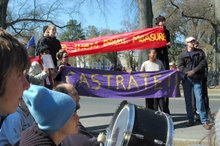




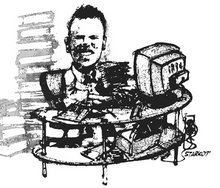
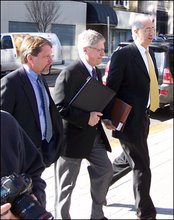
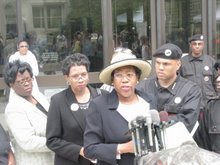
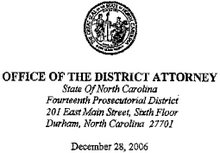
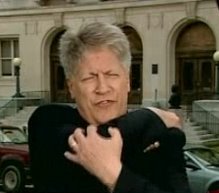

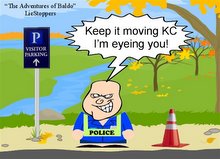

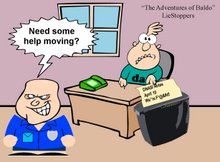

















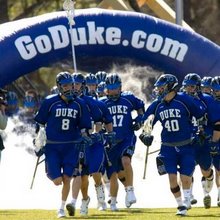

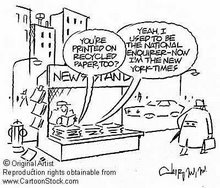

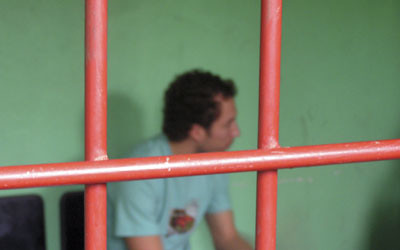
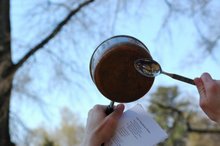


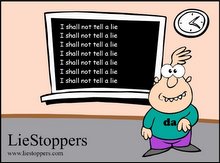






26 comments:
If Mr. Everett believes what he wrote, then he is a fool who has no business practicing law, let alone teaching it to others.
Somebody call the home health care nurse-- Mr. Everett's stopped taking his medication, and he thinks he's a law professor at Duke! sic semper tyrannis
Excellent analysis.
Everett should be held accountable for his role in misleading the public.
I can't believe how badly some teachers at Duke wish their students were guilty of rape (or at least found guilty in trial). I don't know how any parent could send their child to be educated in that environment.
Another embarrassment for Duke! I used to think Duke had the best & the brightest, but lately I believe they also have dumb & dumber on the Faculty.
So let me understand this correctly Professor Everett. Evidence taken in the SANE Rape Kit can only be used for culpatory evidence but anything that is exculpatory can’t be used because of Rape Shield laws? So despite the fact that CGM told the SANE Nurse she hadn’t had sex for a week, DNA testing showed 5 male DNA donors none of which are any Lacrosse Player and she admitted she was an escort working for the Bunnyhole Escort Services; we are to believe her and the Judge is to throw those results from of the court proceedings.
I suggest you talking to Prof Coleman about Project Innocence. Over 160 men have been released from prison because they were convicted on the testimony of the accuser when the DNA found on the accuser later was tested for DNA and it was found not to match the convicted.
Warning to all Duke law Students! Stay far away from this man, as he is incompetent!
Nifong has charged the three men with assault and physical contact. There is evidence of "injuries" which could be associated with the "assault". At issue would be the authors of these "injuries" which come from contact with some individuals. If there is a question as to who had contact with the alleged victim, then the DNA evidence is relevant to show that there was "contact" with the alleged victim by the persons leaving DNA evidence. Here then the DNA evidence is not used for the purpose of showing prior sexual activity--rather the DNA evidence is used to show prior contact which could be the cause of the "injuries".
For the question "Is there evidence that someone other than the accuseds had contact with the alleged victim" (and could have caused the "injuries" in an assault case), the answer is clearly "Yes", and since the answer is "Yes", then that evidence is clearly exculpatory and constitutionally must be disclosed to the defense.
I can't help but wonder what type of law this guy deals with. In any type of litigation (criminal or civil) admissibility is an entirely separate issue from discovery. Now, if the prosecution really believed that the information could not lead to the discovery of admissible exculpatory evidence (and god only knows what type of twisted reason could lead to that conclusion), then he could have provided sufficient information for the defense to determine whether or not to bring the issue to the court. For example, if the report contained a statement that only the results for comparison with the players DNA were included, and that information regarding non-matching DNA, if any was found, was tested but results were not included in the report. The defense would then be on notice of the report's limited disclosure, and litigate the issue as to its adequacy. Where there may be a dispute as to the necessity of disclosure, ethical attorneys do not hide the information necessary for opposing parties to see the issue and bring that dispute to the court for resolution.
Sorry for the OT but your links column has changed. How do I get to the specific topics pages under "Duke Hoax"?
Poor Professor Everett - he needed to confer with Tom Crowley before entering into the hoaz. Seriously, I think eighty year old Prof. Everett just wanted to chat. Please direct him to the blogs so he can chat and not shoot himself in the foot.
Professor Everett is very old and very fat.
The crucial point this article is making, however, is that the Rape Shield Laws do not preclude production of this material to the defense; the Rape Shield Laws do not give the prosecution the right to determine whether it is or is not applicable. That is a job for the judge. By failing to turn over the "other dna" results, the prosecution would preclude the defense from even arguing before the court the applicablility or nonapplicability of any Rape Shield Law because it doesn't even know of the "other dna" existence and thus does not even know this is an issue. At bottom, the Rape Shield Laws do not give to the prosecution the role of gatekeeper to determine what is and what is not relevant or admissible. To the contrary, the Open Discovery law codified at 15A-903 requires the prosecution to “(1)Make available to the defendant the complete files of all law enforcement and prosecutorial agencies involved in the investigation of the crimes committed or the prosecution of the defendant. The term "file" includes the defendant's statements, the codefendants' statements, witness statements, investigating officers' notes, results of tests and examinations, or any other matter or evidence obtained during the investigation of the offenses alleged to have been committed by the defendant. Oral statements shall be in written or recorded form. The defendant shall have the right to inspect and copy or photograph any materials contained therein and, under appropriate safeguards, to inspect, examine, and test any physical evidence or sample contained therein.” The only exception is provided in 15A-904, which precludes production of what is known as attorney work product -- legal theories, research, legal opinions of the prosecutor. Moreover, if a prosecutor feels that it should not turn over certain information to the defense, North Carolina law provides that it must make a motion to the court under 15A-908 and show to the court that discovery should be precluded because of the risk of harm, intimidation, bribery, economic reprisals, unnecessary annoyance or embarrassment of some person. At bottom, it is the province of a Judge, and not a Prosecutor, to determine which evidence is irrelevant, admissible, or unduly prejudicial.
I think DNA confuses the old lawyers - like when the five year olds were invading the Pentagon computers from their PCs, most older folk were having trouble turning their's on. The next generation of lawyers will know every thing about DNS, but the oldies and goodies are still unaware of what it has done for all aspects of society - except for Brad Bannon and Jim Coley of course.
Liestoppers - like the new format a lot. I rarely fo to FODU as the format is a mess.
Just looked at a brief description of his work history, which includes quite a bit of criminal and civil litigation, including quite a bit of work in military justice matters. If I hhad handled a case in which he were opposing counsel, I would be quite concerned about whether he had disclosed all required information. (found the link to his information at http://johnsville.blogspot.com)
I am really starting to feel sorry for students at Duke. What with the Duke 88 and now this law professor you just have to wonder what are they teaching them in class?
This man is a fool. The arguement he presents is so devoid of logic. I guess we should just throw out all exculpatory evidence because it questions the veracity of the accuser.
I was disappointed that the Professor did not disclose his support of Nifong during the elections. It looks like he is unfamiliar with the internet and "full disclose." The man must be brillant, but not up to date.
This is astounding! How can Duke allow this man to be on its law faculty? He is either senile or an idiot. Since when is a DA or(any party to litigation) allowed to determine the admissibility of evidence?
There is only one word for your post -- Outstanding!
However, one cannot help but feel a little sorry for Prof. Everett. I got the feeling that you just shot an unarmed man.
Mike in Nevada
Good Professor Everett has a letter written to the Editor of the N&O published on February 6th. He just wants to chat about the case - please direct him to the blogs.
oh yeah, I forgot to add: We'd like to know a little more about you for our files
We'd like to help you learn to help yourself
From Professor Everts CV, he is any thing but a fool. I asked KC and Bill A to email the Professor and welcome him to the blog. Will someone from liestoppers do the same. This guy just wants to chat.
I don't know a thing about Professor Everett other than what I read in this post, but after reading it can only conclude that he is anything but "a distinguished professor of law."
Distinguished professors of law can demonstrate an ability to read and correctly interpret the law; Everett cannot.
Professor (formerly Judge) Everett is, in the most generous way to say it, a bit out of touch with the world around him. He is very old and, while I think those who know him wuold agree that his intentions are for the best, he is still very 1950s oriented.
Go easy on old Judge Everett. He seems to be an old, likely weary, liberal warhorse. I doubt that the Duke Law School lets him teach any courses by himself. In addition, all his students know what they are getting when they sign up for his courses. Think of him as your granddaddy who cannot see or hear, but still insists on driving every day. Pray for him and hope he doesn't hurt anyone. A letter to the worst newspaper in the United States isn't going to do anyone any harm.
If you are not convinced, just be glad the old Judge is on the other side.
Only a lawyer could argue that the presence of other DNA in and on the accuser is not important in this case. I am a gynecologist. The rape exam showed no rape. The absence of players DNA and the presence of other DNA tells me she had sex with others but not the players. It is unlikely that an exam that is so sensitive that it picked up evidence of other male DNA would not pick up that of the last three that supposedly had deposited semen in, around or on her! What a legal system! How much longer do we have to put up with these idiots?
I had Prof. Everett while a studying at the School of the Environment (then School of Forestry) for a course in Land Use Planning Law. This is considered a "fluff" course by most law students and I don't what other courses the Prof has taught but Land Use Planning Law, as taught by the Prof, has nothing to do with rules of evidence in criminal cases, but maybe I slept through that part of the course (got a A).
Post a Comment